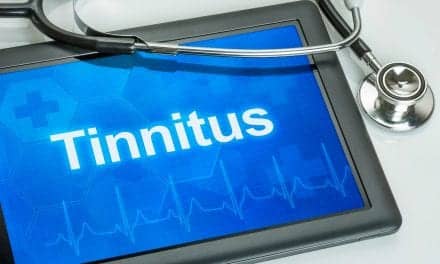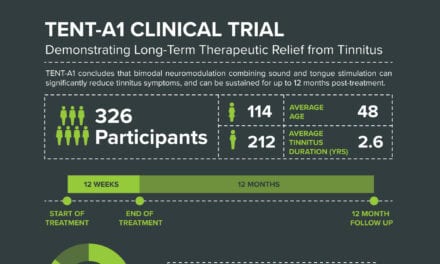Summary: Neuromod Devices expanded its U.S. presence by partnering with 14 new clinics to offer its FDA-approved Lenire tinnitus treatment device.
Takeaways:
- Neuromod Devices has significantly broadened the availability of Lenire, its bimodal neuromodulation device for tinnitus, by partnering with additional clinics in key states, including Alabama, Oregon, North Dakota, California, Florida, Illinois, and Texas.
- The Lenire device has demonstrated clinical efficacy in providing significant relief from tinnitus in both clinical trial settings and real-world applications, leading to its FDA De Novo approval in 2023.
- With a commitment to prioritizing patient care, Neuromod Devices is collaborating with leading audiologists and clinics across the U.S. to ensure that patients suffering from tinnitus have access to their innovative treatment, reflecting the company’s mission to set a new standard of care in tinnitus treatment.
Neuromod Devices, a medical technology company that developed a tinnitus treatment device, Lenire, has partnered with 14 new clinics in the U.S. to address the growing demand for the FDA-approved tinnitus treatment device.
The Lenire Tinnitus Treatment Device
Lenire is a bimodal neuromodulation device which has shown to provide clinically significant relief from tinnitus in clinical trial and real-world settings.1,2,3
The Lenire device was awarded a De Novo FDA Approval Grant in 2023. Neuromod Devices, creators of Lenire, is operating a phased expansion to prioritize patient care excellence at scale, the company says.
This latest expansion will see the clinically proven tinnitus treatment device become available in new states such as Alabama, Oregon, North Dakota, and more. As well as this, further clinics will open in states with significant demand such as California, Florida, Illinois, and Texas.
“Alabama Hearing Associates has worked with tinnitus patients for over twenty-four years,” says Founder of Alabama Hearing Associates, Susan Sheehy, AuD, “Our clinic firmly believes that evidence-based Our clinic firmly believes in offering evidence-based treatment options when managing a patient’s tinnitus journey. For that reason, we are excited to add FDA-approved Lenire to our list of tinnitus services. This is a fantastic new opportunity to help our patients return to the quality of life they had before tinnitus.”
Understanding Tinnitus
Tinnitus, which is commonly known as a ringing in the ears, is a complex neurological condition that causes a perception of sound when there is no external source. It is estimated that at least 25 million Americans6 are currently living with tinnitus. Tinnitus is also the most prevalent service-connected disability compensated for by The United States Veterans Administration (VA), with more than 2.9 million veterans compensated in 2023.4
Neuromod Devices aims to change this by working with leading tinnitus care experts in the United States of America and beyond, the company says. Now 144 audiologists in 87 clinics across America are providing Lenire with further expansion planned through 2024.
“Neuromod’s mission is to create a new standard of care for tinnitus patients, and this goal is achievable only through collaboration with leading hearing and tinnitus care professionals. We are proud to expand Lenire’s accessibility by establishing partnerships with professionals who share Neuromod’s uncompromising patient-centric approach to tinnitus care,” says Eric Timm, Neuromod USA CEO and Neuromod Devices president of global commercial operations.
Lenire’s landmark FDA Approval was awarded following the success of Lenire’s third large-scale clinical trial, TENT-A3.
Lenire’s De Novo submission
Lenire’s De Novo submission demonstrated that 70.5% of patients with moderate or worse tinnitus who experienced no clinically meaningful improvement from six weeks of sound-only therapy reported clinically significant improvement in their tinnitus severity following six weeks of treatment with Lenire.1,5 As well as this, the majority of participants who underwent six weeks of sound-only stimulation reported that a further six weeks of treatment with Lenire provided additional benefit for their tinnitus.1,5
In addition to the majority of participants benefitting from bimodal neuromodulation, 82.4% were compliant to bimodal treatment and 88.6% responded that they would recommend Lenire as a tinnitus treatment1.
Lenire’s positive efficacy, compliance and safety findings for TENT-A3 were highly consistent with the Real-World Evidence from 204 patients included in Lenire’s successful De Novo submission to the US FDA. Across TENT-A3 and the Real-World Evidence, Lenire proved to be inherently safe with zero device-related serious adverse events1. These results build upon the success of two previous landmark clinical trials of Lenire that included more than 500 patients.2,3
Lenire is a bimodal neuromodulation device which works by delivering mild electrical pulses to the tongue, through an intra-oral component called the ‘Tonguetip’, combined with auditory stimulation through headphones to drive long-term changes in the brain to treat tinnitus. This dual action stimulus is proven to provide effective relief from tinnitus.1
Photo: Neuromod
References:
- Neuromod Devices Ltd., Lenire (CR-201) Clinician’s Manual, (2023)
- Conlon et al., Sci. Transl. Med. 12, eabb2830 (2020)
- Conlon et al., Different bimodal neuromodulation settings reduce tinnitus symptoms in a large randomized trial, Sci Rep, https://www.nature.com/articles/s41598-022-13875-x (2022)
- US VA Benefits Report Fiscal Year 2023: https://www.benefits.va.gov/REPORTS/abr/
- As measured by Tinnitus Handicap Inventory (THI). THI is the most widely used clinical standard for measuring the impact of tinnitus on someone’s day-to-day life. The THI is a validated instrument that is measured on a scale of 100, the higher the score, the greater the impact of tinnitus. THI scores are categorized into five severity levels: slight, mild, moderate, severe and catastrophic. Patients that are at least moderately affected by their tinnitus have a THI score of 38 and above and fall into the moderate, severe and catastrophic categories. https://www.nidcd.nih.gov/health/tinnitus
- https://www.nidcd.nih.gov/health/tinnitus





